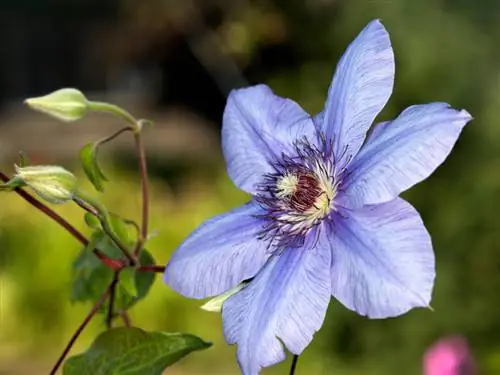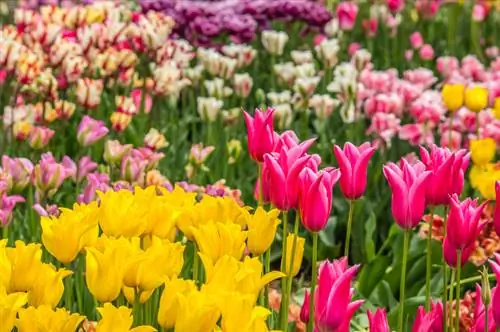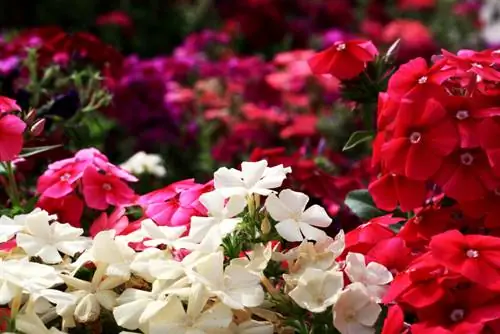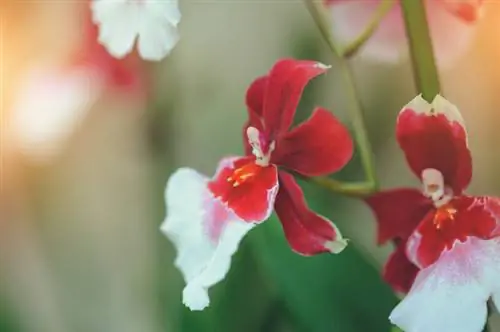- Author admin leonars@hobbygardeners.com.
- Public 2023-12-16 16:46.
- Last modified 2025-06-01 06:02.
The chrysanthemum originally comes from East Asia. This magnificent perennial has been cultivated primarily in Japan, China and Korea for over 1000 years, and a great diversity of varieties was evident early on. The “gold flower”, as the Greek name is translated, is considered a symbol of prosperity and luck - so it is no wonder that Japan has made it a national symbol in a stylized form. The Japanese imperial throne is also called the “Chrysanthemum Throne”. In Catholic France, however, the flower is considered a typical cemetery plant.

Which chrysanthemum varieties are recommended?
There are several thousand varieties of chrysanthemums, some of the most beautiful and tried and tested in the German climate are Goldmarie, Kleiner Bernstein, Mei-Kyo, Fellbacher Wein, Nebelrose, Order Star, Salmon Red Cloud, White Bouquet, Schwabenstolz, Hebe, Red Velvet, Yellow Satellite, Red Julchen, Polar Bear and Emperor of China. All varieties vary in flower color, flowering time and winter hardiness.
Number of chrysanthemum varieties is unknown
Chrysanthemums belong to the daisy family (Asteraceae) and are closely related to local plants such as the daisy (Leucanthemum vulgare), the aster (Aster), the chamomile (Anthemis tinctoria) or the marigold (Calendula).. There are a total of around 40 different species, of which only the garden chrysanthemums and the very late-blooming autumn chrysanthemums are important to us as ornamental plants. However, the number of different varieties within these two species is almost unmanageable - estimates put the number at several thousand different chrysanthemums.
The most beautiful varieties of autumn chrysanthemums
We present some of the most beautiful chrysanthemums - and tried and tested in the German climate - in more detail in the table below. Most are robust autumn chrysanthemums. The flower exhibits great diversity in the colors and shapes of its flowers.
| Variety | Bloom | Flower color | Flowering time | Growth height | Winter hardiness |
|---|---|---|---|---|---|
| Goldmarie | half-filled | golden yellow | from the end of August | 60 to 80 cm | hardy |
| Small Amber | half-filled | apricot to yellow brown | October to November | 80cm | hardy |
| Mei-Kyo | Pompon | pink violet | September to October | 50 to 60 cm | hardy |
| Fellbacher wine | half-filled | burgundy | September to October | 70cm | low |
| Mist Rose | filled | pink, silvery touch | October to November | 80cm | hardy |
| Order Star | filled | goldbronze | August to November | 90 cm | hardy |
| Salmon Red Cloud | filled | red | August to November | 80cm | hardy |
| White Bouquet | Pompon | white | September to October | 80 to 110 cm | hardy |
| Swabian pride | filled | dark red | September to October | 60 to 80 cm | moderate |
| Hebe | easy | violet | October to November | 70cm | hardy |
| Red Velvet | filled | burgundy | August to November | 70 - 110 cm | moderate |
| Yellow Satellite | spiderlike | lemon yellow | September to November | 100 -130 cm | hardy |
| Red Yule | Pompon | strong pink | September to October | up to 50 cm | hardy |
| Polar Bear | filled | white, lemon yellow center | September to November | up to 50 cm | hardy |
| Emperor of China | filled | pink | October to November | up to 60 cm | hardy |
Tips & Tricks
The so-called edible chrysanthemum grows to a height of around 40 to 100 centimeters and can be used for teas, but also as a herb.






